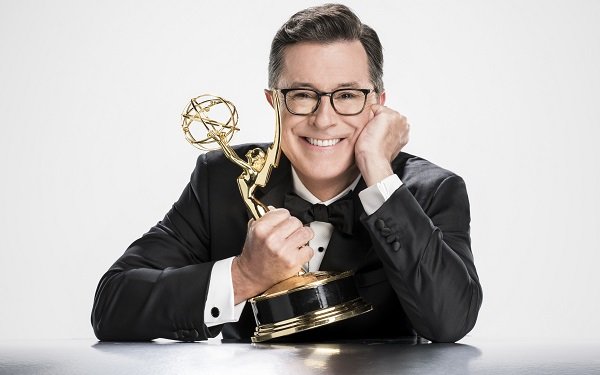
The Emmy Awards are the TV biz’s
annual rite of pre-fall, the scene-setter for the new television season.
As such, Emmy time is as good as any time for assessing the state of the TV biz -- at least where the evolution of
content is concerned.
With the 69th annual Primetime Emmy Awards coming this Sunday (September 17) on CBS, here are a few things we can glean about TV now:
Colbert's in the driver's
seat. Stephen Colbert (pictured above) is this year's host mainly because it is CBS’ turn to air the show. So it is merely coincidental that he is hosting the Emmys in the same year that he
overtook Jimmy Fallon’s “Tonight Show” in the ratings.
Coincidence or not, it is worth noting that there is a new pecking order in late-night TV. Colbert appears to have put
CBS in first place at 11:35 p.m. in a way that appears sustainable. It's the first time the CBS “Late Show” has been in first place since David Letterman started the show in August
1993.
advertisement
advertisement
Letterman maintained his lead over Jay Leno and “The Tonight Show” on NBC until summer 1995, when Leno overtook him for good. Colbert's lead over Fallon feels like the same
thing.
TV needs to figure out a way to define “what is TV.” As noted earlier this summer in a TV Blog about this year’s nominations, video content services both
large and small were honored with Emmy nods.
There were all of the usual suspects, of course -- the broadcast networks, basic cable networks, so-called premium channels (HBO and Showtime, for
example) and those added more recently to the Emmy nomination fray such as Netflix.
But Emmy nominations were also picked up by services and Web sites such as Arts.gov, Open TV,
Play.Google.com and Facebook Live.
Of these four, I'll bet two of them are not familiar to many -- Arts.gov and Open TV (whatever that is). The other two are more familiar because
“Google” and “Facebook” are part of their names.
Whether any of their video content rises to the level of an Emmy nomination is anybody's guess. But the voters at the
TV Academy apparently felt it was appropriate to include them somehow, perhaps in recognition that video content -- like TV -- is everywhere these days and takes many forms.
But if that's the
case, then the pool of video content that would seemingly then become eligible for Emmy consideration just multiplied a million-fold.
Perhaps some criteria should be adopted for Emmy
consideration so that it doesn't seem like everything under the sun can now nominate itself for an award.
Can't we all agree on what constitutes actual TV shows? To paraphrase something a
Supreme Court justice once said on another subject, I think we all know what “real” TV is when we see it.
Speaking of pecking orders … The aforementioned
“rotation” system, in which the Emmys are aired each year by one of the Big Four broadcast networks (CBS, NBC, ABC or Fox) would seem to indicate that even with all the forces of change
that are buffeting the old broadcast order, these four networks still represent the best way of distributing programming to the near-totality of U.S. TV households.
This is likely why the
Emmys have not been shared with the likes of basic cable or pay cable. When it comes to celebrating itself, the TV industry knows where to put its best foot forward. And in many ways, that is still
broadcast television.